

China along with other Allied forces, including the Soviet Union, United States, France and England, were firm partners in the war against Fascism and Militarism, forming a bond forged with blood and sacrifice in World War II. All the soldiers, Chinese or foreign, put up formidable resistance fighting shoulder by shoulder to defeat the Fascists and militarists and many of them devoted their lives in foreign lands. Let's have a look at some of the efforts and contributions made by Chinese and overseas soldiers.
Chinese residents helped the American pilots selflessly after realizing they were friends, not enemies and left many moving stories worth telling.
The Chinese people built and maintained dozens of airports during World War II, providing for a massive airlift of fuel and supplies for Allied forces and serving as a crucial base to oppose Japanese aerial bombardments in the Asia-Pacific region.
Yan Baohang, a wartime secret agent who is best remembered for an intervention that helped to bring Japan's occupation of China to an end.
A Soviet pilot, nicknamed aerial tank, helped China shoot down 7 Japanese aircraft during the War of Resistance against Japanese Aggression.
Overseas Chinese played a significant role in the victory in the world's anti-Fascist war by becoming a formidable resistance force. More than 13,000 Chinese were in the United States Army during World War II, accounting for more than a fifth of the total number of male overseas Chinese in the US. Let's have a look at some of the efforts and contributions made by overseas Chinese.
Over eight years in Hunan and Yunnan provinces, Chinese masters in all subjects gathered at NSAU, producing two future Nobel Prize laureates and eight scientists who were to work on the atomic bomb.
Yan Baohang (1895-1968), an intelligence agent of the Chinese Communist Party during World War II, obtained the information that Germany was to attack the Soviets on June 22rd in Chongqing in May of 1941. He sent the intelligence to Yan'an through classified channels on July 6th.
A Soviet soldier died a martyr's death in southwestern China’s Chongqing having devoted himself to the Chinese People's War of Resistance against Japanese Aggression.
Northeast China played host to some of the highest-ranked Allied officers and civilian officials during the years leading up to the end of World War II. However, none of them were there of their own volition. Instead, they were being held by the Japanese.
Michael Lindsay arrived in China in 1938 intending merely to teach Keynesian economics. Instead, he was inspired to play a crucial role in the country's resistance against the invading Japanese forces.
Captain Brooke Dolan II traveled to the central battlefront of Hebei province as a US observer in January of 1945 when China was undergoing the final crucial phase of the anti-Japanese war.
The March of the Volunteers,the national anthem of China was once heard in an open-air concert in New York – in rusty Chinese. It was in 1941 and the singer was American Paul Robeson.
China and the Soviet Union were firm allies in the war against fascism and militarism, forming a bond forged with blood and sacrifice in World War II. Many Chinese devoted themselves to the battle against the German fascists at crucial, difficult times in the Soviet Union's Great Patriotic War.
The International Military Tribunal for the Far East (IMTFE), established by the Allies after World War II, started trying 28 Japanese military and government officials for war crimes in Tokyo on May 3, 1946.
Qian Xiulin, a Chinese woman who had moved to Belgium in 1929, was hailed as Belgium's "Chinese mother" after saving the lives of nearly 100 Belgians during Nazi Germany's occupation from May 1940.
Seventy years on, only a handful of Chinese combatants are still alive, and although most are now age 90 or older, their memories of the conflict are still vivid.
In November 1941, 2,000 young Canadian soldiers crossed the Pacific Ocean and landed in Hong Kong to fight the Japanese army, which was occupying the then-British Crown Colony. More than 500 of them never returned home.
During World War II, a team of US army photographers spent two years recording the everyday lives and struggles of people living in and around the China-Burma-India Theater, which saw some of the fiercest action of the war in the Pacific.
Editor's Note: This is the fifth in a series of special reports about the experiences of foreigners who either lived or served in China between 1937 and 1945.
Border city honors the Chinese-Russian girl who tried to save the lives of Chinese and Russian soldiers at the end of World War II.
The Anti-Japanese Amalgamated Army of the Northeast returned to China after being trained in the Soviet Union since 1940 to support the Soviet army’s march into China's northeast and fight against the Japanese Kwantung Army.
Cao Baoming is desperate to record as many stories as possible about events in the Changbai Mountains more than 70 years ago, when the 1,300-kilometer-long range was the main theater of resistance to the Japanese occupation of China.
He Fengshan, known as the "Oskar Schindler of China," a diplomat who, while serving as the Chinese Consul General in Vienna from 1938 to 1940, saved the lives of thousands of Jews by giving them visas and helping them shelter in Shanghai as they escaped Nazi persecution during World War II.
The ceremony for Japan's surrender in China Theater was held in the auditorium of the Central Military Academy in Nanjing on September 9, 1945.
The famous Normandy landing in northern France on June 6, 1944 by the Allies was only made possible with the innovation of Chinese engineer Ye Shaoyin, who improved a vacuum tube used for surface-to-air communication that helped coordinate the landing.
They ran into the night as the bombs continued to fall, the rattle of machine gun fire drawing closer as they made for the last train and their last chance of escape.
A Chinese scholar was part of a US team that liberated a Japanese internment camp in East China, freeing more than 2,000 expat civilians.
Shen A'gui stared vacantly at the ceiling above his bed, hands fluttering weakly like broken birds on the bunched-up blankets.
Day|Week

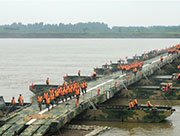 PLA builds 500m pontoon bridge in 15 minutes
PLA builds 500m pontoon bridge in 15 minutes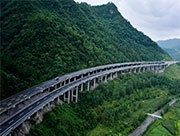 Aerial photos of highways in the 'Mountain City'
Aerial photos of highways in the 'Mountain City'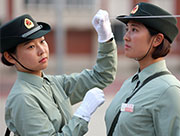 The only female soldiers' formation at China's V-Day Parade
The only female soldiers' formation at China's V-Day Parade Asia’s largest glass viewing platform to open soon
Asia’s largest glass viewing platform to open soon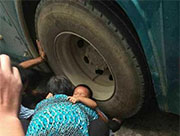 100 passers-by lift bus to save little girl under wheel
100 passers-by lift bus to save little girl under wheel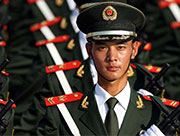 In pics: Chinese infantry in parades
In pics: Chinese infantry in parades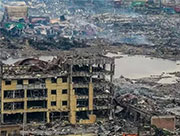 Shocking scenes of core blast area in Tianjin
Shocking scenes of core blast area in Tianjin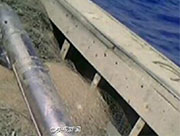 Fisherman nets a spy device in S China Sea
Fisherman nets a spy device in S China Sea